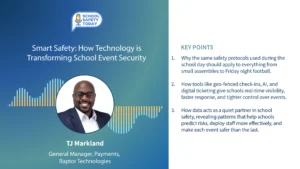Administrators Can’t Forget Online Security when Planning for Fall’s Return to School
Many schools realized they couldn’t safely return to the classroom after spring break or simply a weekend because of the coronavirus pandemic. Most had to turn to online options to educate students.
But there were some frequent roadblocks to success, including getting devices to students and making sure they had access to the internet. In the rush to get up to speed, important factors to consider fell by the wayside. Now that administrators have had months to think about going back to school, however, there’s time to develop a plan that David Waugh, Chief Revenue Officer of ManagedMethods, said needs to center on security.
“There were a lot of lessons learned about, ‘OK, there’s too much exposure, too much access.’ It wasn’t because of the schools doing or lack of doing, it was that many vendors that work in EdTech and suppliers were caught off guard, as well,” Waugh said. “Google, Microsoft, Zoom – there were a lot of deficiencies that were exposed, because they hadn’t been explored yet.”
While Waugh applauds the efforts those companies have made to close loopholes and increase security, he noted that administrators still need to make sure they have a handle on everything that happens during the virtual school day, just like they would at a campus.
“In everything you do, [think about if] there’s a way to monitor and audit and control it,” he said. “Because, if you’re trying to roll out something for the upcoming school year, but you can’t explicitly say, ‘Yes, I can monitor and tell you everything that’s happening. I can provide you audit reports and we can control it,’ as in we can stop it, shut it down, etc. – if you can’t answer those questions, you’ve really got to pause and think about it.
“You’re then putting at risk the district, as well as the end users, which are the children.”
For the latest news, videos, and podcasts in the Education Technology Industry, be sure to subscribe to our industry publication.
Follow us on social media for the latest updates in B2B!
Twitter – @MarketScale
Facebook – facebook.com/marketscale
LinkedIn – linkedin.com/company/marketscale









